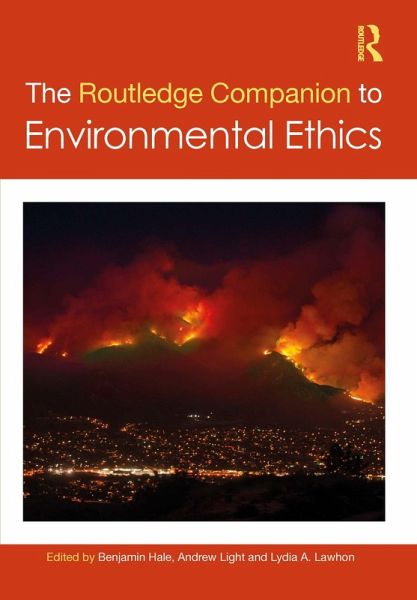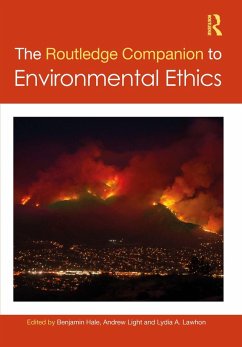
The Routledge Companion to Environmental Ethics (eBook, ePUB)
Versandkostenfrei!
Sofort per Download lieferbar
43,95 €
inkl. MwSt.
Weitere Ausgaben:

PAYBACK Punkte
22 °P sammeln!
Written for a wide range of readers in environmental science, philosophy, and policy-oriented programs The Routledge Companion to Environmental Ethics is a landmark, comprehensive reference work in this interdisciplinary field. Not merely a review of theoretical approaches to the ethics of the environment, the Companion focuses on specific environmental problems and other concrete issues. Its 65 chapters, all appearing in print here for the first time, have been organized into the following eleven parts:I. AnimalsII. LandIII. WaterIV. ClimateV. Energy and ExtractionVI. CitiesVII. AgricultureVI...
Written for a wide range of readers in environmental science, philosophy, and policy-oriented programs The Routledge Companion to Environmental Ethics is a landmark, comprehensive reference work in this interdisciplinary field. Not merely a review of theoretical approaches to the ethics of the environment, the Companion focuses on specific environmental problems and other concrete issues. Its 65 chapters, all appearing in print here for the first time, have been organized into the following eleven parts:
I. Animals
II. Land
III. Water
IV. Climate
V. Energy and Extraction
VI. Cities
VII. Agriculture
VIII. Environmental Transformation
IX. Policy Frameworks and Response Measures
X. Regulatory Tools
XI. Advocacy and Activism
The volume not only explains the nuances of important core philosophical positions, but also cuts new pathways for the integration of important ethical and policy issues into environmental philosophy. It will be of immense help to undergraduate students and other readers coming up to the field for the first time, but also serve as a valuable resource for more advanced students as well as researchers who need a trusted resource that also offers fresh, policy-centered approaches.
I. Animals
II. Land
III. Water
IV. Climate
V. Energy and Extraction
VI. Cities
VII. Agriculture
VIII. Environmental Transformation
IX. Policy Frameworks and Response Measures
X. Regulatory Tools
XI. Advocacy and Activism
The volume not only explains the nuances of important core philosophical positions, but also cuts new pathways for the integration of important ethical and policy issues into environmental philosophy. It will be of immense help to undergraduate students and other readers coming up to the field for the first time, but also serve as a valuable resource for more advanced students as well as researchers who need a trusted resource that also offers fresh, policy-centered approaches.
Dieser Download kann aus rechtlichen Gründen nur mit Rechnungsadresse in A, B, BG, CY, CZ, D, DK, EW, E, FIN, F, GR, HR, H, IRL, I, LT, L, LR, M, NL, PL, P, R, S, SLO, SK ausgeliefert werden.













